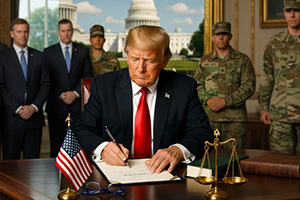Call Now For A Case Evaluation
Call Now For A Case Evaluation
 As a constitutional law expert, it’s crucial to examine the legal frameworks governing the use of federal military forces within the United States given the current political climate where federal troops are being deloyed for domestic law enforcement. The Insurrection Act of 1807, now codified in relevant parts at 10 U.S.C. §§ 252, 253, and 254, provides the President with significant authority to deploy troops for domestic law enforcement in extraordinary circumstances. This power, however, must be viewed in contrast to the Posse Comitatus Act of 1878, codified at 18 U.S.C. § 1385, which generally prohibits such uses. In this blog post for Georgia Criminal Lawyer, we’ll explore the legal basis of the Insurrection Act, highlight historical examples of its invocation, and compare it to the Posse Comitatus Act. There have been no invocations since 1992—though recent political discussions have raised the possibility. For the most current developments, consult official government records or legal databases.
As a constitutional law expert, it’s crucial to examine the legal frameworks governing the use of federal military forces within the United States given the current political climate where federal troops are being deloyed for domestic law enforcement. The Insurrection Act of 1807, now codified in relevant parts at 10 U.S.C. §§ 252, 253, and 254, provides the President with significant authority to deploy troops for domestic law enforcement in extraordinary circumstances. This power, however, must be viewed in contrast to the Posse Comitatus Act of 1878, codified at 18 U.S.C. § 1385, which generally prohibits such uses. In this blog post for Georgia Criminal Lawyer, we’ll explore the legal basis of the Insurrection Act, highlight historical examples of its invocation, and compare it to the Posse Comitatus Act. There have been no invocations since 1992—though recent political discussions have raised the possibility. For the most current developments, consult official government records or legal databases.
The Insurrection Act originated in 1807 as a means to empower the President to address domestic unrest that overwhelms state authorities or obstructs federal law. It was enacted amid concerns over insurrections and enforcement of federal statutes, such as during the early republic’s challenges with rebellions and embargoes. Over time, it has been amended and recodified, with its core provisions now found in Title 10 of the U.S. Code.
These sections collectively vest broad executive power, subject to limited judicial review. For instance, in Martin v. Mott, 25 U.S. 19 (1827), the U.S. Supreme Court held that the President’s decision to invoke such authority (under predecessor statutes) is a political question not subject to court challenge, emphasizing deference to executive judgment in emergencies.
The Insurrection Act has been invoked approximately 30 times since 1807, often in response to insurrections, labor disputes, racial violence, or natural disasters. Here are key examples spanning U.S. history:
No invocations have occurred since 1992, though discussions arose in 2020 and 2025 contexts. For updates, check congressional reports or the Brennan Center for Justice.
In contrast, the Posse Comitatus Act restricts military involvement in domestic law enforcement. Codified at 18 U.S.C. § 1385, it provides: “Whoever, except in cases and under circumstances expressly authorized by the Constitution or Act of Congress, willfully uses any part of the Army, the Navy, the Marine Corps, the Air Force, or the Space Force as a posse comitatus or otherwise to execute the laws shall be fined under this title or imprisoned not more than two years, or both.” (June 18, 1878, ch. 263, § 15, 20 Stat. 152; amended Mar. 3, 1899, ch. 429, § 363; June 6, 1900, ch. 786, § 29; Pub. L. 86–70, June 25, 1959; Pub. L. 103–322, title XXXIII, § 330016(1)(L), Sept. 13, 1994; Pub. L. 117–81, div. A, title X, § 1045(a), Dec. 27, 2021.) Enacted post-Reconstruction to prevent military overreach in civilian affairs, it applies by criminalizing unauthorized uses, with exceptions for constitutional powers or statutes like the Insurrection Act.
| Aspect | Insurrection Act (10 U.S.C. §§ 252–254) | Posse Comitatus Act (18 U.S.C. § 1385) |
| Purpose | Authorizes military deployment to enforce laws during insurrections, violence, or obstructions. | Prohibits military use in law enforcement unless expressly allowed. |
| Scope | Broad presidential discretion for domestic crises, including rights deprivations. | General ban on willful military involvement in civilian policing. |
| Exceptions/Relation | Serves as a statutory exception to Posse Comitatus, allowing overrides in specified scenarios. | Allows exceptions via Constitution or Congress, e.g., Insurrection Act invocations. |
| Penalties/Enforcement | No direct penalties; relies on executive action. | Criminal penalties (fine or up to 2 years imprisonment); rarely prosecuted. |
| Historical Impact | Used in crises like civil rights enforcement; promotes federal intervention. | Limits military role post-Civil War; protects against abuse. |
The Insurrection Act empowers action where Posse Comitatus restricts it, creating a tension resolved by explicit invocation. This balance safeguards democracy while allowing emergency responses.
The Insurrection Act remains a potent tool for presidential law enforcement, as demonstrated historically, but its interplay with the Posse Comitatus Act underscores limits on military domestic roles. In Georgia, where civil rights history intersects with modern criminal law, understanding these statutes is vital for assessing federal-state dynamics. Can President Trump deploy Federal Troops domestically? The short answer is it depends and must be evaluated on a case by case basis. However, protesters laying siege to ICE facilities maybe be inadvertently or intentionally inviting deployment of Federal troops. We are not taking a position on the issue but only understanding the legal basis in the event that we have clients that get arrested. If facing related legal issues, contact George C. Creal Jr. P.C., Trial Lawyers for a free case evaluation. For evolving interpretations, refer to current U.S. Code or Supreme Court decisions.

George Creal is a trial lawyer who has been practicing law
in the Metro-Atlanta area for over 27 years. George brings
a broad range of experience to the courtroom. Read More